Unit 1Where did you go on vacation Section B 2a-2e Language points语言点课件(共48张PPT)人教版八年级上册
文档属性
| 名称 | Unit 1Where did you go on vacation Section B 2a-2e Language points语言点课件(共48张PPT)人教版八年级上册 |  | |
| 格式 | pptx | ||
| 文件大小 | 3.1MB | ||
| 资源类型 | 教案 | ||
| 版本资源 | 人教新目标(Go for it)版 | ||
| 科目 | 英语 | ||
| 更新时间 | 2024-09-08 20:40:36 | ||
图片预览



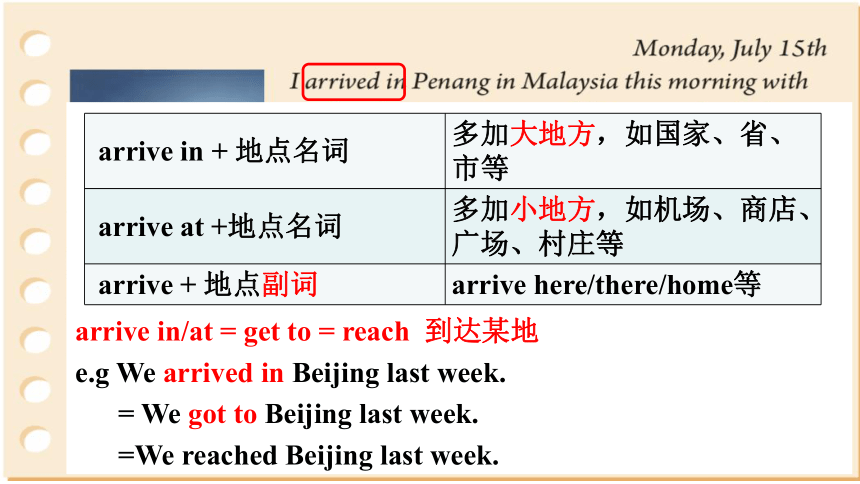

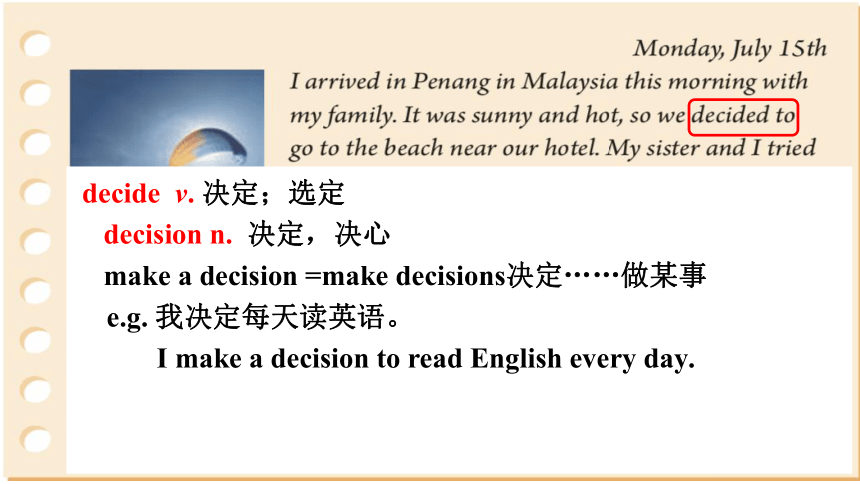

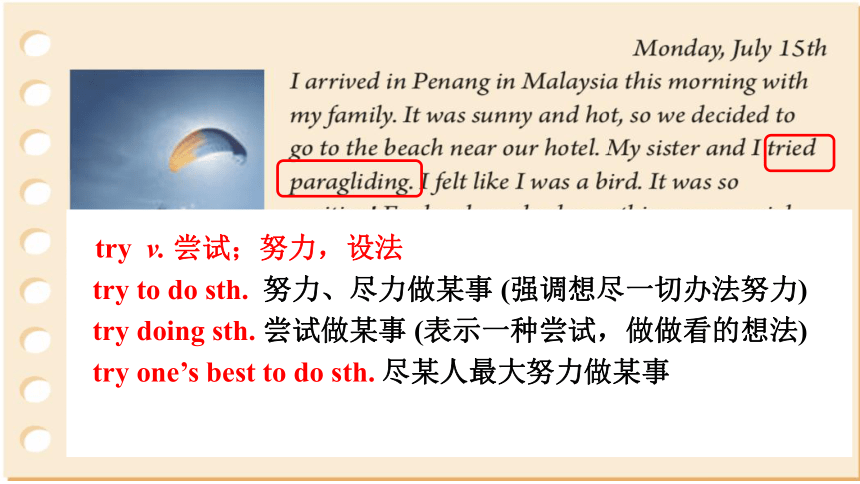
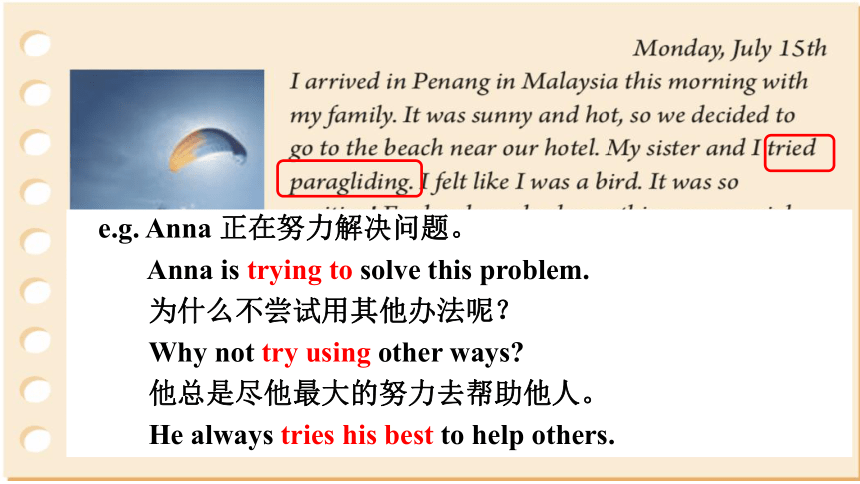

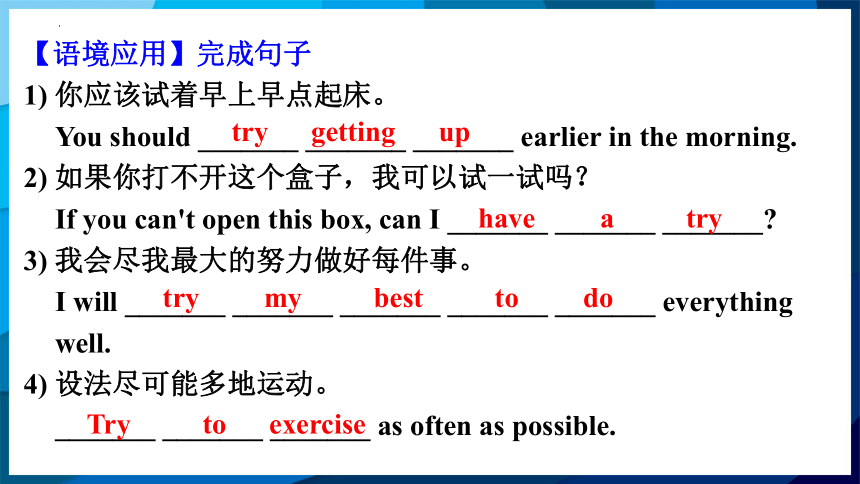
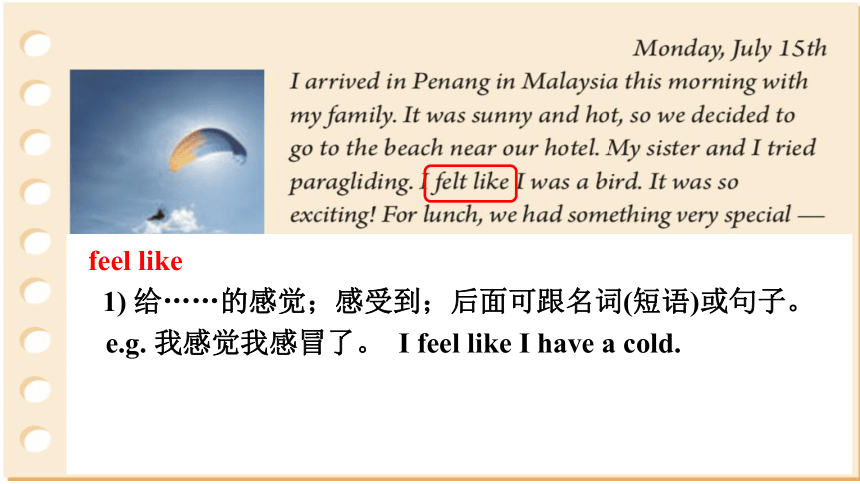
文档简介
(共48张PPT)
a week:
Monday, Tuesday, Wednesday, Thursday, Friday,
Saturday, Sunday.
weekdays 工作日(Monday-Friday)
weekends 周末 on/at weekends = at/on the weekend
on+具体的某一天
a year:
January, Febuary, March, April, May, June, July, August,
September, October, November, December.
in年,in 月,in季节,on+具体的某一天
在6月25日
在教师节那天
arrive in + 地点名词 多加大地方,如国家、省、市等
arrive at +地点名词 多加小地方,如机场、商店、广场、村庄等
arrive + 地点副词 arrive here/there/home等
arrive in/at = get to = reach 到达某地
e.g We arrived in Beijing last week.
= We got to Beijing last week.
=We reached Beijing last week.
decide v. 决定;选定
decide (not) to do sth. 决定(不)做某事
decide + 疑问词+不定式 决定……做某事
e.g. We can’t decide when to leave.
decide + 宾从
e.g.They can’t decide when they should leave.
decide v. 决定;选定
decision n. 决定,决心
make a decision =make decisions决定……做某事
e.g. 我决定每天读英语。
I make a decision to read English every day.
【语境应用】根据汉语意思完成英语句子,每空一词。
1) 我决定不了穿什么。
I can’t ________ ________ ________ ________.
2) 我决定告诉他这件事。
I ________ ________ ________ him this thing.
3) 汤姆应该作决定吗?
________ Tom ________ ________ ________
decide what to wear
decided to tell
Should make a decision
try v. 尝试;努力,设法
try to do sth. 努力、尽力做某事 (强调想尽一切办法努力)
try doing sth. 尝试做某事 (表示一种尝试,做做看的想法)
try one’s best to do sth. 尽某人最大努力做某事
e.g. Anna 正在努力解决问题。
Anna is trying to solve this problem.
为什么不尝试用其他办法呢?
Why not try using other ways
他总是尽他最大的努力去帮助他人。
He always tries his best to help others.
try n. 尝试,努力 have a try 试一试
【语境应用】完成句子
1) 你应该试着早上早点起床。
You should _______ _______ _______ earlier in the morning.
2) 如果你打不开这个盒子,我可以试一试吗?
If you can't open this box, can I _______ _______ _______
3) 我会尽我最大的努力做好每件事。
I will _______ _______ _______ _______ _______ everything well.
4) 设法尽可能多地运动。
_______ _______ _______ as often as possible.
try getting up
have a try
try my best to do
Try to exercise
feel like
1) 给……的感觉;感受到;后面可跟名词(短语)或句子。
e.g. 我感觉我感冒了。 I feel like I have a cold.
feel like
2) 想(要);愿意
feel like (doing) sth. =would like (to do) sth. =want (to do) sth.
e.g. 我想今天晚上看电影。
I feel like watching a movie tonight.
= I would like / want to watch a movie tonight.
【语境应用】
Ⅰ. 选出下列句子中划线部分的汉语意思。
A. 感觉好像 B. 想(要)
( )1) My brother feels like a new schoolbag.
( )2) Tom feels like he is a fish when he swims.
Ⅱ. 完成句子,每空一词。
I want to go to the beach tomorrow. (改为同义句)
I ________ ________ ________ to the beach tomorrow.
B
A
feel like going
吃三餐:
have / eat breakfast, lunch, dinner/supper
something special
adj.修饰不定代词,放在不定代词之后。即:
不定代词+adj.
eg. 没有重要的事情
nothing important
一天的时间
in the morning/ afternoon/ evening
at noon/ night
wonder vt. 想知道,琢磨 =want to know
vi. 惊奇,惊讶,后面常跟介词at
他对这幅画感到惊讶。
He wonders at this picture.
n. 奇迹,奇观(可数); 惊讶,惊叹(不可数)
世界八大奇迹。
the eight wonders of the world
wonder+从句 我想知道他们在哪。
I wonder where they are.
【语境应用】
Ⅰ. 请选出能填入空白处的最佳选项。
I wonder ________ John did that for.
A. that B. if C. what D. why
Ⅱ. 请用wonder的适当形式填空。
1) The Great Pyramid is one of the ancient __________ in the world.
2) Have you seen the __________ film
C
wonders
wonderful
enjoy vt. 喜欢;欣赏;享受
enjoy doing sth. 喜欢做某事
eg. 我喜欢读书。
I enjoy reading books.
enjoy oneself 玩得开心;过的愉快=have fun=have a good time
eg. 昨天晚上你玩的开心吗?
Did you enjoy yourself last night
What 和 How 引导的感叹句区别。
1.What + a/an + adj. +可名单(+主语+谓语)!
eg.刘子桢是一个多么漂亮的女孩呀!
What a beautiful girl (Liu Zizhen is)!
2.What +adj. +可名复/不可数n. (+主语+谓语)!
eg.我们班的同学有好有趣!
What interesting classmates (we are)!
What 和 How 引导的感叹句区别。
3.How + adj. /adv. + (+主语+谓语)!
eg.刘致远跑的真快!
How fast (Liu Zhiyuan runs)!
difference n. 差别;差异 (different adj. )
双胞胎也会有差异。
The twins also have some differences.
1.the differences between A and B A和B之间的不同
王妙谚和陈俊玮的区别是。。。
2.know/tell the differences between A and B
知道/分辨出A和B之间的区别
eg.你能知道这两幅画的区别吗?
Can you know/tell the differences between the two pictures
different adj. 不同的
be different from B 与... 的不同
eg.都市生活和乡村生活是非常不同的。
City life is very different from country life.
top n. 顶部,表面
at the top of 在...顶端(强调在点上)
on the top of 在... 顶部(强调在面上)
eg.王祥羽在山顶。
Wang Xiangyu is on the top of the mountain.
start v. 开始 开始做某事
start to do sth.=begin to do sth.
start to do sth.=start doing sth.
eg. 当英语老师进来时,我们就开始读书。
When the English teacher come, we start to reading/start reading.
a little 一点 修饰v./adj./adv.
eg. 我只会说一点日语。
I can only speak a little Japanese.
辨析: a little, little, a few,few
有a则肯,无a则否。 三可六不可
1.take the train= by train
乘坐交通工具:
2.take 和by的替换:
我坐公交车上学。
I take the bus to school.=I go to school by bus.
wait v. 等待;等候
wait for sb. / sth. (to do sth.) 等待某人/某事去做某事
wait to do sth. 等待去做某事
wait (for) +一段时间
can’t wait to do sth. 迫不及待做某事
【语境应用】根据汉语意思完成英语句子,每空一词。
1) 孩子们正等着吃饭呢。
The children are ________ ________ ________ dinner.
2) 我还在等Mary还书呢。
I’m still ________ ________ ________ ________ ________ the book.
3) Jack迫不及待地打开了礼物。
Jack can’t ________ ________ ________ the present.
4) 我们正在等着雨停。
We are ________ ________ ________ ________ to stop.
5) 恐怕你得等十分钟。
I’m afraid you have to ________ ________ ________ minutes.
waiting to have
waiting for Mary to return
wait to open
waiting for the rain
wait for ten
over prep.
1.over = more than 多于,超出
20多只鸟
over 20 birds = more than 20 birds
2.在...之上,正上方不接触 (反:under)
我的头上有一个灯。(正上方)
There is a light over my head.
over prep.
3.over 遍及
他们在全世界都很受欢迎。
They are popular all over the world.
too many, too much, 太多
much too 太=too
hard adj.&adv.
adv. 1.大量地
昨天雨下的很大。
It was raining hard yesterday.
2.adv.努力地
努力学习
study hard
3.adv.坚硬的
一个坚硬的石头
a hard stone
an umbrella 一把雨伞
a, an用法
鸡蛋 an egg
单元 a unit
大学 a university
一个
because of 因为,由于
词条 不同点
because of 介词短语,后可跟名词、代词或动词-ing形式。
because 连词,后跟句子,构成原因状语从句。
【语境应用】用because或because of填空。
1) Jane didn’t go to school __________ her illness.
2) I close the windows ___________ the wind is blowing strongly.
3) They are here ___________ us.
because of
because
because of
not anything= nothing 没有什么
eg.没有什么能改变我对你的爱。
Nothing is gonna change my love for you.
= Not anything is gonna change my love for you.
Nothing is impossible.
=Everything is possible.
could see nothing
below prep. & adv. 在……下面,到……下面
below指的是物体在某物下方,但不一定是正下方,所指范围较宽。反义词是above。
词条 不同点 例句
below 某物处较低位置,不一定是正下方 We are below the moon.
under 处于某物正下方 The boy stood under the tree.
below /b 'l / prep.& adv. 在……下面;到……下面
e.g.
1.山下许多的游客在往上爬。
Below the mountain, many visitors are walking up here.
(作介词)
2.请看看下面的新闻。
Please look at the news below.(作副词)
【辨析】below/above; on/beneath, over/under
bring v.
bring sb. sth.= bring sth. to sb. 给某人带某物
辨析:bring 和 take
enough adj. 足够的;充足的 可置于名词的前面或后面。
have enough + n. + to do sth. 有足够的...可以做某事
eg.我们有足够的水喝。
We have enough water to drink.
adv. 足够地;充分地;常置于形容词或副词后。
adj. / adv.+ enough (+ for sb.) + to do sth. (对某人来说)足够…能…
纪展鹏说得足够多。
Ji Zhanpeng speak much enough.
adv. 足够地;充分地;常置于形容词或副词后。
adj. / adv.+ enough (+ for sb.) + to do sth. (对某人来说)足够…能…
eg.纪展鹏说得足够多。
Ji Zhanpeng speaks much enough.
段添硕足够高能进篮球社团。
Duan Tianshuo is tall enough to join in the basketball club.
【语境应用】根据汉语意思完成英语句子,每空一词。
1) 我们有足够的书给这些孩子们。
We have ________ ________ for the children.
2) 这个房间足够大,可以放三张床。
The room is __________ __________ to take three beds.
3) 我们离开得不够早。
We didn’t leave __________ __________.
enough books
big / large enough
early enough
hungry adj. 饥饿的
(反)full adj. 饱的
thirsty adj. 渴的
a week:
Monday, Tuesday, Wednesday, Thursday, Friday,
Saturday, Sunday.
weekdays 工作日(Monday-Friday)
weekends 周末 on/at weekends = at/on the weekend
on+具体的某一天
a year:
January, Febuary, March, April, May, June, July, August,
September, October, November, December.
in年,in 月,in季节,on+具体的某一天
在6月25日
在教师节那天
arrive in + 地点名词 多加大地方,如国家、省、市等
arrive at +地点名词 多加小地方,如机场、商店、广场、村庄等
arrive + 地点副词 arrive here/there/home等
arrive in/at = get to = reach 到达某地
e.g We arrived in Beijing last week.
= We got to Beijing last week.
=We reached Beijing last week.
decide v. 决定;选定
decide (not) to do sth. 决定(不)做某事
decide + 疑问词+不定式 决定……做某事
e.g. We can’t decide when to leave.
decide + 宾从
e.g.They can’t decide when they should leave.
decide v. 决定;选定
decision n. 决定,决心
make a decision =make decisions决定……做某事
e.g. 我决定每天读英语。
I make a decision to read English every day.
【语境应用】根据汉语意思完成英语句子,每空一词。
1) 我决定不了穿什么。
I can’t ________ ________ ________ ________.
2) 我决定告诉他这件事。
I ________ ________ ________ him this thing.
3) 汤姆应该作决定吗?
________ Tom ________ ________ ________
decide what to wear
decided to tell
Should make a decision
try v. 尝试;努力,设法
try to do sth. 努力、尽力做某事 (强调想尽一切办法努力)
try doing sth. 尝试做某事 (表示一种尝试,做做看的想法)
try one’s best to do sth. 尽某人最大努力做某事
e.g. Anna 正在努力解决问题。
Anna is trying to solve this problem.
为什么不尝试用其他办法呢?
Why not try using other ways
他总是尽他最大的努力去帮助他人。
He always tries his best to help others.
try n. 尝试,努力 have a try 试一试
【语境应用】完成句子
1) 你应该试着早上早点起床。
You should _______ _______ _______ earlier in the morning.
2) 如果你打不开这个盒子,我可以试一试吗?
If you can't open this box, can I _______ _______ _______
3) 我会尽我最大的努力做好每件事。
I will _______ _______ _______ _______ _______ everything well.
4) 设法尽可能多地运动。
_______ _______ _______ as often as possible.
try getting up
have a try
try my best to do
Try to exercise
feel like
1) 给……的感觉;感受到;后面可跟名词(短语)或句子。
e.g. 我感觉我感冒了。 I feel like I have a cold.
feel like
2) 想(要);愿意
feel like (doing) sth. =would like (to do) sth. =want (to do) sth.
e.g. 我想今天晚上看电影。
I feel like watching a movie tonight.
= I would like / want to watch a movie tonight.
【语境应用】
Ⅰ. 选出下列句子中划线部分的汉语意思。
A. 感觉好像 B. 想(要)
( )1) My brother feels like a new schoolbag.
( )2) Tom feels like he is a fish when he swims.
Ⅱ. 完成句子,每空一词。
I want to go to the beach tomorrow. (改为同义句)
I ________ ________ ________ to the beach tomorrow.
B
A
feel like going
吃三餐:
have / eat breakfast, lunch, dinner/supper
something special
adj.修饰不定代词,放在不定代词之后。即:
不定代词+adj.
eg. 没有重要的事情
nothing important
一天的时间
in the morning/ afternoon/ evening
at noon/ night
wonder vt. 想知道,琢磨 =want to know
vi. 惊奇,惊讶,后面常跟介词at
他对这幅画感到惊讶。
He wonders at this picture.
n. 奇迹,奇观(可数); 惊讶,惊叹(不可数)
世界八大奇迹。
the eight wonders of the world
wonder+从句 我想知道他们在哪。
I wonder where they are.
【语境应用】
Ⅰ. 请选出能填入空白处的最佳选项。
I wonder ________ John did that for.
A. that B. if C. what D. why
Ⅱ. 请用wonder的适当形式填空。
1) The Great Pyramid is one of the ancient __________ in the world.
2) Have you seen the __________ film
C
wonders
wonderful
enjoy vt. 喜欢;欣赏;享受
enjoy doing sth. 喜欢做某事
eg. 我喜欢读书。
I enjoy reading books.
enjoy oneself 玩得开心;过的愉快=have fun=have a good time
eg. 昨天晚上你玩的开心吗?
Did you enjoy yourself last night
What 和 How 引导的感叹句区别。
1.What + a/an + adj. +可名单(+主语+谓语)!
eg.刘子桢是一个多么漂亮的女孩呀!
What a beautiful girl (Liu Zizhen is)!
2.What +adj. +可名复/不可数n. (+主语+谓语)!
eg.我们班的同学有好有趣!
What interesting classmates (we are)!
What 和 How 引导的感叹句区别。
3.How + adj. /adv. + (+主语+谓语)!
eg.刘致远跑的真快!
How fast (Liu Zhiyuan runs)!
difference n. 差别;差异 (different adj. )
双胞胎也会有差异。
The twins also have some differences.
1.the differences between A and B A和B之间的不同
王妙谚和陈俊玮的区别是。。。
2.know/tell the differences between A and B
知道/分辨出A和B之间的区别
eg.你能知道这两幅画的区别吗?
Can you know/tell the differences between the two pictures
different adj. 不同的
be different from B 与... 的不同
eg.都市生活和乡村生活是非常不同的。
City life is very different from country life.
top n. 顶部,表面
at the top of 在...顶端(强调在点上)
on the top of 在... 顶部(强调在面上)
eg.王祥羽在山顶。
Wang Xiangyu is on the top of the mountain.
start v. 开始 开始做某事
start to do sth.=begin to do sth.
start to do sth.=start doing sth.
eg. 当英语老师进来时,我们就开始读书。
When the English teacher come, we start to reading/start reading.
a little 一点 修饰v./adj./adv.
eg. 我只会说一点日语。
I can only speak a little Japanese.
辨析: a little, little, a few,few
有a则肯,无a则否。 三可六不可
1.take the train= by train
乘坐交通工具:
2.take 和by的替换:
我坐公交车上学。
I take the bus to school.=I go to school by bus.
wait v. 等待;等候
wait for sb. / sth. (to do sth.) 等待某人/某事去做某事
wait to do sth. 等待去做某事
wait (for) +一段时间
can’t wait to do sth. 迫不及待做某事
【语境应用】根据汉语意思完成英语句子,每空一词。
1) 孩子们正等着吃饭呢。
The children are ________ ________ ________ dinner.
2) 我还在等Mary还书呢。
I’m still ________ ________ ________ ________ ________ the book.
3) Jack迫不及待地打开了礼物。
Jack can’t ________ ________ ________ the present.
4) 我们正在等着雨停。
We are ________ ________ ________ ________ to stop.
5) 恐怕你得等十分钟。
I’m afraid you have to ________ ________ ________ minutes.
waiting to have
waiting for Mary to return
wait to open
waiting for the rain
wait for ten
over prep.
1.over = more than 多于,超出
20多只鸟
over 20 birds = more than 20 birds
2.在...之上,正上方不接触 (反:under)
我的头上有一个灯。(正上方)
There is a light over my head.
over prep.
3.over 遍及
他们在全世界都很受欢迎。
They are popular all over the world.
too many, too much, 太多
much too 太=too
hard adj.&adv.
adv. 1.大量地
昨天雨下的很大。
It was raining hard yesterday.
2.adv.努力地
努力学习
study hard
3.adv.坚硬的
一个坚硬的石头
a hard stone
an umbrella 一把雨伞
a, an用法
鸡蛋 an egg
单元 a unit
大学 a university
一个
because of 因为,由于
词条 不同点
because of 介词短语,后可跟名词、代词或动词-ing形式。
because 连词,后跟句子,构成原因状语从句。
【语境应用】用because或because of填空。
1) Jane didn’t go to school __________ her illness.
2) I close the windows ___________ the wind is blowing strongly.
3) They are here ___________ us.
because of
because
because of
not anything= nothing 没有什么
eg.没有什么能改变我对你的爱。
Nothing is gonna change my love for you.
= Not anything is gonna change my love for you.
Nothing is impossible.
=Everything is possible.
could see nothing
below prep. & adv. 在……下面,到……下面
below指的是物体在某物下方,但不一定是正下方,所指范围较宽。反义词是above。
词条 不同点 例句
below 某物处较低位置,不一定是正下方 We are below the moon.
under 处于某物正下方 The boy stood under the tree.
below /b 'l / prep.& adv. 在……下面;到……下面
e.g.
1.山下许多的游客在往上爬。
Below the mountain, many visitors are walking up here.
(作介词)
2.请看看下面的新闻。
Please look at the news below.(作副词)
【辨析】below/above; on/beneath, over/under
bring v.
bring sb. sth.= bring sth. to sb. 给某人带某物
辨析:bring 和 take
enough adj. 足够的;充足的 可置于名词的前面或后面。
have enough + n. + to do sth. 有足够的...可以做某事
eg.我们有足够的水喝。
We have enough water to drink.
adv. 足够地;充分地;常置于形容词或副词后。
adj. / adv.+ enough (+ for sb.) + to do sth. (对某人来说)足够…能…
纪展鹏说得足够多。
Ji Zhanpeng speak much enough.
adv. 足够地;充分地;常置于形容词或副词后。
adj. / adv.+ enough (+ for sb.) + to do sth. (对某人来说)足够…能…
eg.纪展鹏说得足够多。
Ji Zhanpeng speaks much enough.
段添硕足够高能进篮球社团。
Duan Tianshuo is tall enough to join in the basketball club.
【语境应用】根据汉语意思完成英语句子,每空一词。
1) 我们有足够的书给这些孩子们。
We have ________ ________ for the children.
2) 这个房间足够大,可以放三张床。
The room is __________ __________ to take three beds.
3) 我们离开得不够早。
We didn’t leave __________ __________.
enough books
big / large enough
early enough
hungry adj. 饥饿的
(反)full adj. 饱的
thirsty adj. 渴的
同课章节目录
- Unit 1 Where did you go on vacation?
- Section A
- Section B
- Unit 2 How often do you exercise?
- Section A
- Section B
- Unit 3 I'm more outgoing than my sister.
- Section A
- Section B
- Unit 4 What's the best movie theater?
- Section A
- Section B
- Unit 5 Do you want to watch a game show?
- Section A
- Section B
- Unit 6 I'm going to study computer science.
- Section A
- Section B
- Unit 7 Will people have robots?
- Section A
- Section B
- Unit 8 How do you make a banana milk shake?
- Section A
- Section B
- Unit 9 Can you come to my party?
- Section A
- Section B
- Unit 10 If you go to the party, you'll have a grea
- Section A
- Section B
